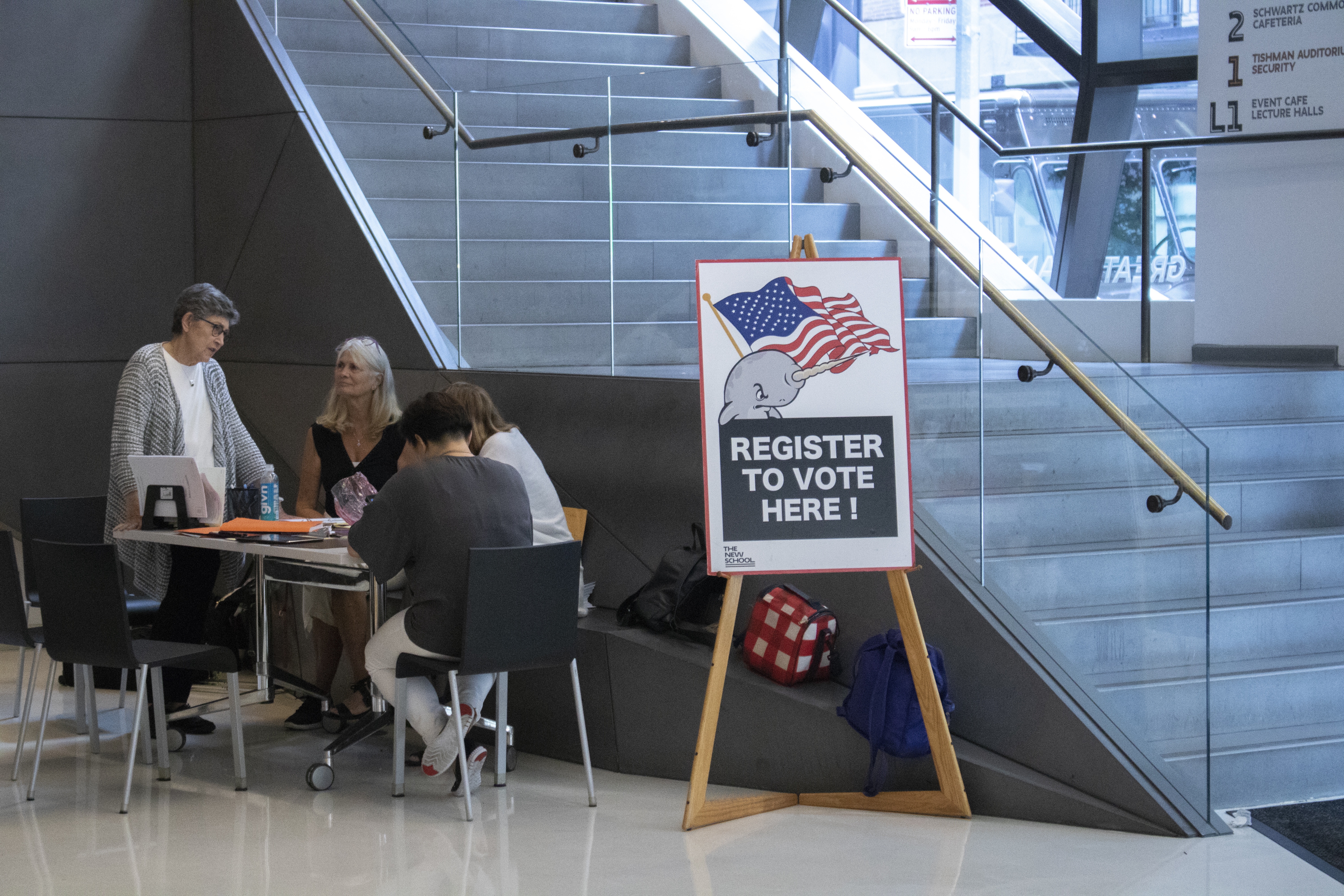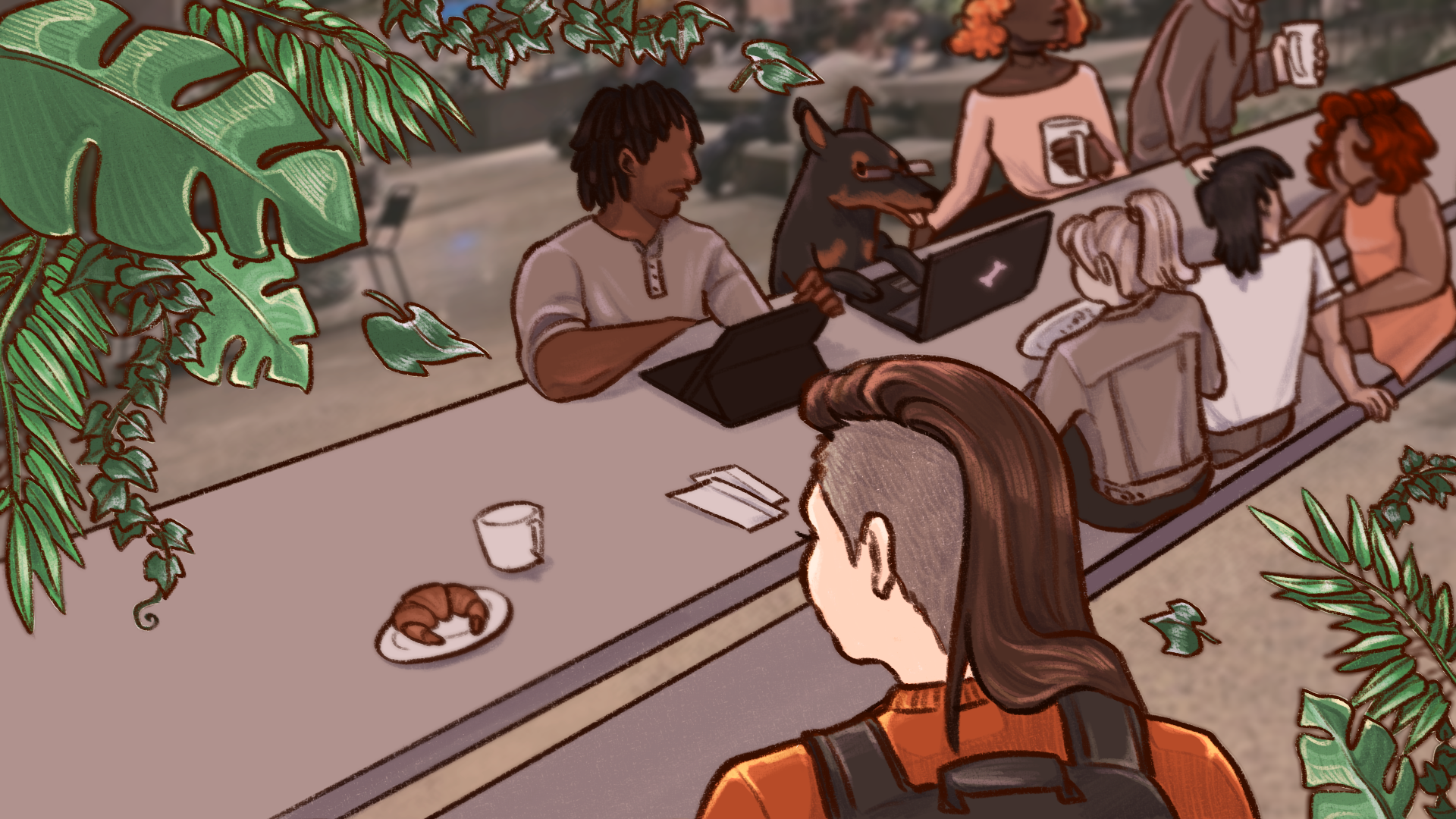At first glance, the three students sitting at a table brimming with paperwork amid bustling co-eds coming and going, may seem out of place. They look like grandmothers — three women who can describe the Vietnam War protests or recall the country’s mood during the Watergate scandal.
In fact, they can detail these epic events and many more. But today, they are merely registering their fellow, albeit much younger, students to vote. Since August, they’ve registered more than 400 New Schoolers and have no intention to stop anytime soon.
“Voter registration seemed like an obvious thing to do,” said Ettie Taichman, a retired social worker. “We had a feeling that students would be responsive. We were right because we are now being besieged by students who want to vote.”
Taichman and her peers are sprinting to register as many as they can before October 12, the deadline for the midterm elections.
The midterm elections, apart from their importance in this current political environment, are a cyclical opportunity for citizens to exert their prerogatives in choosing who they want to represent them in the United States Congress.
Taichman, along with Lisa Cristal and Denise Waxman, launched their voter registration drive as part of a project for the university’s Institute for Retired Professionals. The IRP is a continuing education program for people aged 55 and older, located in the 16 St. building.
24 additional volunteers are involved with the project, which is supervised by the advisory board of the IRP.
The trio came up with the idea for the voter registration project, which stemmed from their political viewpoints and strong feelings about the 2016 election.
Initially, Waxman and Taichman sent out notices about upcoming political activities but did not feel that the community response was sufficient.
“We knew that a lot of millennials didn’t vote,” said Cristal, “and we thought it was important that people vote, regardless of their political affiliation. We saw that as a failing of the election.”
Only 49 percent of eligible millennials, those ages 18 to 35, voted in the 2016 election, according to a study by Pew Research Center.
Registering to vote takes all of three minutes — a remarkably simple process that has amazed students, staff, and faculty alike.
“I have wanted to register for a while but it’s such a hassle,” said Stephen Mascall, admission events coordinator for The New School. “I heard that the table was here and I ran over from the office. I’m not sure I would have registered in time, without these women.”
Rita Silverman, an IRP member and retired university professor who volunteers at the table for the voter registration project, believes that young people need a reason to compel them to be politically active. “Having a group of older women and a few men come up and ask you if you’re registered to vote,” said Silverman, “I mean, I think you can look at us and see your grandmother. They appreciate that we are doing this and we appreciate that they are excited and interested.”
“I think it’s really great that they’re doing this.” said Sarah Little, a third year studying global studies at Lang, “They helped me get an absentee ballot for my district. It was a simple process and they made it so convenient.”
While quick and easy for most, some have to return repeatedly with more questions or in need of help with completing forms.
“One of the things I appreciate most about them is their expertise in the area of voter registration and how eager they are to counsel students with questions,” said George Saad, senior office manager of Student Leadership and Involvement at The New School.
Saad has provided support for the voter registration project since its inception. He is a collaborator and partner to the IRP women, responsible for scheduling their table in the lobby, advertising their work, and making their bulletin signs.
One of Taichman’s greatest concerns is that some students think they are registered when they’re not. States like New York, Georgia and Virginia purged close to 16 million voters from the rolls between 2014 and 2016, according to a 2018 report by the Brennan Center for Justice.
For students who currently live in New York but have family residence in another state, the IRP women can answer questions about which state they are allowed to register in, and help them fill out absentee ballots.
“It’s their decision to decide where their vote matters the most,” said Cristal. “We’re just there to educate them, not to influence them.”
The three care deeply about civic life, a commitment that stretches back to their teenage years.
Taichman grew up in Toronto, Canada, where she took classes in civics from an early age and often discussed politics with her family at the dinner table. “I voted from the day I was able to, which was 21,” she said. “I would never have thought of skipping voting. It seemed like a right and a privilege as a citizen. I always had a strong sense of justice.”
Taichman became an American citizen in 1967 and embarked on an extensive career in social work, helping people with civil legal problems in areas such as domestic violence, health care, and social security.
Taichman has two daughters and three grandchildren. “I worry about what the world will be like for them,” she said.
Cristal, a retired lawyer with two children, was born in St. Louis, Missouri and moved to New York City when she was 28. She became interested in politics amid the political scandal of her generation — Watergate.
“People were engaged then just like people are engaged now,” Cristal said. “But the difference is that towards the end of Watergate, Republicans and Democrats were working together for the better good of the country. I think politics now are much more polarized.”
Cristal worked on the Hillary Clinton campaign manning the Election Protection hotline, and before that, for the Barack Obama campaign, where she worked the phone banks, ensuring voters go to the polls.
Similarly, Waxman, a Los Angeles native and retired lawyer, became politically engaged early on, when she was 18. She attended Occidental College at the height of the Vietnam War and her campus was one of the hundreds in the country that went on strike in protest against the war.
“It’s a much busier world than it was when I was 20,” said Waxman. “Being able to talk with this generation at the tables, I have a general sense of not being as engaged or organized. Not that there aren’t exceptions, but there are so many distractions and it’s overwhelming for everybody.”
After the next election, the trio will start advocating for changes in the law. One of their main concerns is the regressive voting legislation in New York state, which requires citizens to register at least 25 days before the election, unlike other states that allow day-of registration. For New York primary elections, citizens of New York must register a year in advance and register in a political party affiliation to be eligible to vote.
At the moment, however, the women are focused on registering as many as they can for the midterms. The fast approaching deadline for registering in New York state is October 12. Anyone wishing to vote in the November 6 elections will have to register by then.
The IRP volunteers plan on being back at their table at least once per month following the November 6 election and will come back in full force in 2019 in preparation for the 2020 presidential election.
“We’ve been very impressed with the caliber of students here, their civic mindedness and their enthusiasm about wanting to vote,” said Taichman. “This is a do-or-die time. It feels like it’s time that, at the very least, everybody has to vote and have their voices heard.”
Photo by Orlando Mendiola







